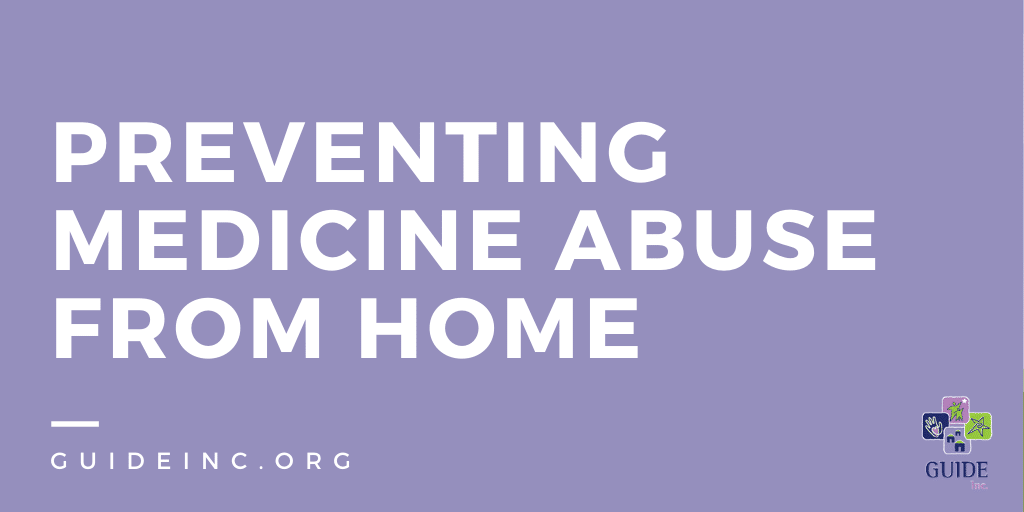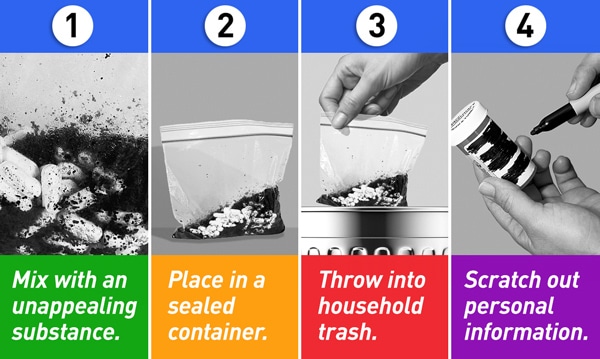Prevent prescription drug misuse and abuse in your home! With everyone spending more time at home these days, many of us are cleaning and organizing more than ever. An important part of our homes to focus on during this time is our medicine cabinets. Many of us have expired, unused or unwanted prescription drugs at home. Taking inventory of your medicine cabinet and cleaning it out regularly is a powerful prevention tool, especially if you have children. Safe storage and disposal of medications reduce opportunities for easy access and the chance that your medications will be used in ways that are unsafe or illegal.
Whether you have missed a recent DEA National Prescription Drug Take Back Day or local drop box locations are inaccessible, there are definitely ways you can clean out your medicine cabinet and safely dispose of prescription drugs without leaving your home!

How to Clean Out Your Medicine Cabinet
- Check the dates. Anything that is expired should be disposed of. Medications may lose their effectiveness after their expiration dates, and some even become toxic. For medications that don’t contain expiration dates, they should be discarded one year after they were purchased.
- Check the medication for any signs of alteration. Anything that displays signs of changes in color, smell or taste should be disposed of.
- Ensure all medication is in its original container. If you come across anything that is not in its original container, where you can’t identify what it is, who it belongs to, how to take it and the expiration date, it should be disposed of. In the future, always remember to keep medications in their original containers to ensure safety.
- Ensure all medications you possess are absolutely necessary. Prescription medications, especially painkillers, should only be kept when they are in use and currently needed. Anything that is left over from a past injury or ailment that is healed should be disposed of.
- Ensure all medication is stored in a safe place. Medications should be locked away or otherwise inaccessible to children, pets, house guests or even other family members to whom they don’t belong. More information on why this is important can be found here. Medications should also be stored in a cool, dry place, protected from extreme cold, excessive heat, humidity and direct light (the kitchen and bathroom are not ideal locations).
The above list has been adapted from National Kidney Foundation, Institute for Safe Medicine Practices and Office of Disease Prevention and Health Promotion.
How to Dispose of Your Expired, Unused or Unwanted Medications at Home
Once you’ve determined which medications you would like to discard, the next step is to determine your best method of disposal. Despite popular beliefs, medications should never be flushed down the toilet or dumped down the drain.
If you are unable to get to a collection site or do not have one in your area, follow these federal guidelines for proper disposal at home:
- Remove prescription drugs from their original containers.
- Mix the drugs with an undesirable substance, such as dirt, cat litter or used coffee grounds. (Some retailers also offer disposal solutions that enable patients to dispose of leftover medications in their trash, such as DisposeRx.)
- Place the mixture into a disposal container with a lid or a sealable plastic bag.
- Conceal all personal information from the original container’s prescription label to make it unreadable by covering it with a permanent marker or duct tape, or scratch the label off completely.
- Place the sealed mixture and original drug container in your household trash.
Do you have a plan of action for cleaning out your medicine cabinet? Using the tips presented here, you can take the steps today to make your home safer. If you have any questions about cleaning out your medicine cabinet or safe medication disposal, please feel free to contact Kimberly Wilson at kimberly@guideinc.org.

